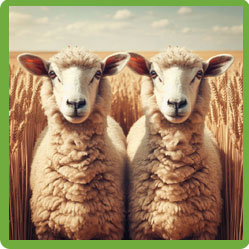
Genetics
Genetics is the study of how traits are passed from parents to their offspring through DNA. Learn about genes, alleles, inheritance, and how characteristics like eye colour or blood type are determined. You’ll also explore genetic diagrams (like Punnett squares), genetic disorders, and the role of DNA and chromosomes in inheritance.
What Is Genetics?
Genetics is the study of how characteristics (like eye colour or blood type) are passed down from parents to their offspring through genes. These traits are inherited through DNA, which carries the instructions for making proteins that determine our features.
Chromosomes, DNA and Genes
Inside the nucleus of every cell are chromosomes—long strands of DNA.
Humans have 23 pairs of chromosomes (46 in total).
A gene is a short section of DNA that codes for a specific protein.
Different versions of a gene are called alleles (e.g. dominant or recessive).
Revision Notes

The Cornell method is like a supercharged note-taking system that helps you ace your revision!
Print out our blank revision notes pages to help you revise.
How to make effective revision notes with the Cornell method.
Exam Questions & Answers

Download and print off practice our FREE worksheet with exam style questions on Cell Biology.
Reproduction in Living Organisms
Reproduction is the biological process through which organisms produce offspring. There are two main types of reproduction:
- Asexual reproduction – only one parent is needed, and the offspring are genetically identical to the parent (clones). There’s no fusion of gametes or mixing of genetic material.
- Sexual reproduction – involves two parents. Male and female gametes (like sperm and egg cells) fuse during fertilisation, leading to offspring that are genetically different from both parents.
Asexual Reproduction
Asexual reproduction is common in bacteria, some plants, and some animals (like certain insects or starfish). It results in clones, meaning there’s no variation in the DNA unless a mutation occurs.
Key features:
- Involves only mitosis (cell division)
- Produces genetically identical offspring
- Quick and efficient in stable environments
Sexual Reproduction and Gametes
In sexual reproduction:
- Gametes are sex cells (sperm in males, eggs in females in animals; pollen and ovules in plants)
- These are formed in a special type of cell division called meiosis
- Fertilisation occurs when gametes fuse, restoring the full number of chromosomes
This mixing of genetic material introduces variation in the offspring, which is important for evolution and survival in changing environments.
Meiosis – Making Gametes
Meiosis is a type of cell division that produces four non-identical gametes, each with half the number of chromosomes of the parent cell.
Key points:
- It happens in reproductive organs (e.g. testes and ovaries)
- DNA is copied once, but the cell divides twice
- Each gamete ends up with a unique combination of chromosomes
This process increases genetic diversity among offspring.
Genetic Diagrams and Inheritance
Genetic diagrams like Punnett squares are used to show how alleles are inherited.
- Dominant alleles (e.g. B) always show in the offspring’s appearance if present.
- Recessive alleles (e.g. b) only show if both copies are recessive.
These tools help predict the probability of a child inheriting a certain trait or disorder.
Inherited Disorders
Some disorders are passed on through genes. You need to know about:
- Cystic fibrosis – a recessive disorder that affects cell membranes and causes thick mucus in the lungs and digestive system.
- Polydactyly – a dominant disorder that causes extra fingers or toes.
You may be asked to interpret family trees or genetic crosses to predict the inheritance of these conditions.
Genetic Testing and Ethics
Genetic testing can be used during pregnancy or after birth to check for inherited conditions. There are ethical issues with this, such as deciding whether to continue a pregnancy or concerns over genetic privacy.
Selective Breeding and the Gene Pool
Selective breeding is when humans breed animals or plants with desirable traits (e.g. high milk yield or disease resistance).
Over time, this reduces the gene pool (variety of alleles), which can make populations more vulnerable to disease or inherited defects.
Cloning and Embryo Transplants
Cloning creates genetically identical organisms. There are two main types:
- Embryo transplants – splitting an early embryo and implanting the clones into different host mothers.
- Adult cell cloning – using a body cell’s nucleus and placing it into an egg cell with no nucleus, then stimulating it to divide.
Cloning can be useful for medicine and farming, but it raises ethical concerns about biodiversity and animal welfare.
Also see Hormonal Coordination, Variation & Evolution
Revision Notes

The Cornell method is like a supercharged note-taking system that helps you ace your revision!
Print out our blank revision notes pages to help you revise.
How to make effective revision notes with the Cornell method.


